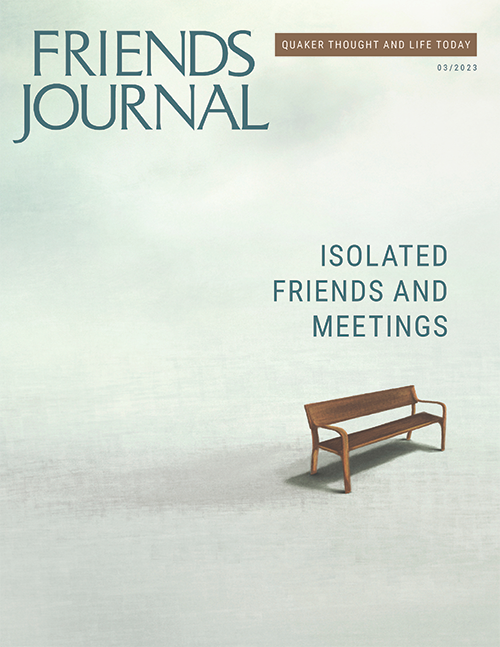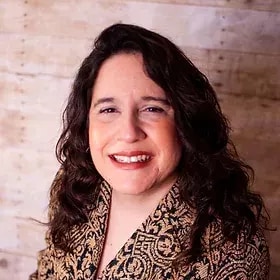A Friends Journal Report on Virtual Meetings
Meeting virtually due to the COVID-19 shutdowns that began in 2020 enabled Friends to expand meetings to include people who faced barriers due to geographic distance and differing physical abilities. Friends’ responses to the shift to online gatherings varied: Some embraced the new format as an opportunity; some grieved the loss of in-person community; while others considered virtual worship a balance of strengths and weaknesses. “It’s definitely a mixed blessing,” Brian Young, pastoral minister at West Richmond (Ind.) Meeting, said of virtual worship.
Online worship enabled meetings to include Quakers from outside the immediate surroundings of meetinghouses, forming international and interstate connections that would not have arisen without the shift to new technology. Virtual gatherings caused meetings to rely on the gifts of members and attenders who were well-versed in working with technology, creating new service opportunities. Convening online also included worshipers for whom physical challenges previously made it impossible to participate in in-person meetings.
Asked to describe the shortcomings of online meetings, one Quaker explained that she did not think in terms of online gatherings’ disadvantages but saw meeting virtually and congregating in person as different experiences. “It’s just like the way that salad doesn’t have the shortcoming of not being dessert. It’s just not dessert. It’s just a different thing,” said Emily Savin (she/her) a host of Three Rivers, a worship group under the care of Fresh Pond Meeting in Cambridge, Massachusetts.
Three Rivers began meeting in 2020 as a virtual worship gathering, but it is not exclusively an online group, according to Callid Keefe-Perry (he/him), a host of Three Rivers. Savin and Keefe-Perry spoke together in a videoconference interview. Savin moved from Boston to New York City at the beginning of the pandemic to take care of her grandmother. Being able to attend the same worship group despite moving has meant a lot to her.
Other Friends have also built deep relationships through online worship with geographically distant Quakers. One member of a meeting in Denver, Colorado, regularly joins a worship group in Ireland virtually. “We’re interacting on a soul-to-soul level every week, so it really builds intimate, strong connections,” said Rachel Moran, in a videoconference interview. Moran, who lives in Denver, attends Cork (Ireland) Midweek Worship Group online. She is a member of Mountain View Meeting in Denver, where she also worships. Her plan is to become a member of the Cork Midweek Worship Group after moving to Ireland in 2023. Moran traveled to Ireland to meet Friends from the worship group and found that the relationships she had developed online continued in person.
Friends’ responses to the shift to online gatherings varied: Some embraced the new format as an opportunity; some grieved the loss of in-person community; while others considered virtual worship a balance of strengths and weaknesses.
Some Quakers who are accustomed to in-person worship find that online gatherings do not adequately promote group cohesion among members who are not well-acquainted. Ian Cook, co-clerk of Central Manchester (UK) Meeting, wrote in an email:
You might have picked up that I’m not a great fan of video meetings. I think that they work best for functional groups who already know each other. I’m not sure how well a forming-storming-norming-performing process works over a purely remote environment where there is a real possibility of unintended hurt without the possibility of corrective strokes.
“Forming-storming-norming-performing” is a concept developed by psychological researcher Bruce W. Tuckman in the mid-1960s to describe the process through which a group establishes an identity and works for a common purpose.
Videoconferencing does not enable Friends to connect to the Divine as naturally as they could when meeting in person, according to Nikki Coffey Tousley, clerk of Dayton (Ohio) Meeting. “There’s a nonverbal element to the presence of Spirit that just doesn’t come through online for me,” Coffey Tousley said in a videoconference interview.
Interpersonal connection online lacks familiar physicality, according to Rhiannon Grant, who works for Woodbrooke in its Centre for Research in Quaker Studies in Birmingham, United Kingdom. “You can’t give somebody a hug, and you can’t pass them a biscuit,” said Grant, who is a member of Bournville Meeting in Birmingham, in a videoconference interview.
Convening virtually has allowed meetings to include worshipers who live too far away to travel regularly to in-person gatherings. Quakers from distant islands in Hawaii would have to fly, then drive, to gather at the meetinghouse of Honolulu Meeting, according to Mary Anne Magnier, clerk of the meeting. Attending via videoconference makes it feasible for them to participate. Worshipers also join the meeting virtually from Palau, as well as the East and West Coasts of the United States.
A member of Birmingham (Ala.) Meeting who moved to Marquette, Michigan, for work continues to worship with the congregation virtually, said member Mark Gooch in a videoconference interview. One member from Italy worships online, as does another from North Carolina. During the shutdown, the meeting welcomed an attender from Barcelona, Spain. Emily Savin of Three Rivers Worship Group in Massachusetts noted that someone from Iceland attends that meeting.
Nikki Holland, director of Belize Friends Ministries, a mission of Friends United Meeting (FUM), lives in Belize; she and her spouse joined West Richmond (Ind.) Meeting. “That process was almost completely remote,” said Brian Young, pastoral minister at West Richmond.
Meetings need not cohere around a geographic location. Woodbrooke has an all-virtual worship group that is tied to the center’s educational offerings, Rhiannon Grant said. Members and attenders are considering making the gathering its own meeting. They are discussing whether to place it under the care of Britain Yearly Meeting or to have it be its own yearly meeting.
Geography is not the only physical barrier Friends must overcome to attend in-person meeting. Friends with disabilities might need adaptations to get to meeting or to fully participate once they are there.
Mark Gooch of Birmingham (Ala.) Meeting uses a wheelchair due to a spinal-cord injury. During the 13 months he spent in the hospital, he deeply missed meeting for worship. Gooch and his wife do not own cars, and he relies completely on public transportation, which does not run on Sundays in Birmingham. Friends have offered to drive him to meeting, but his wheelchair is too big to fit into their cars. Although the meetinghouse has a ramp approved by the Americans with Disabilities Act (ADA) and a platform to transfer from vehicles, it is too far away for Gooch to travel by wheelchair from his house. The ADA of 1990 protected the civil rights of people with disabilities and improved physical access to public places. The shift to online gathering enabled Gooch to join worship again. “It’s meant everything for me because I’ve been able to come back to meeting,” Gooch said in a videoconference interview.
In addition to making weekly worship more accessible to people who use wheelchairs, videoconferencing technology can more fully include people in meeting for worship for business. Offering a transcription of the audio of a virtual meeting for worship for business can assist people with varying sensory abilities. Providing audio recordings allows people who would have difficulty reading transcripts to participate. “In some ways, we can be way more accessible,” said Callid Keefe-Perry of Three Rivers. “It allows us to be multi-modal in a way business meeting rarely is.” Three Rivers is a worship group, so it does not yet conduct meetings for worship for business. Members and attenders of Three Rivers are exploring becoming a monthly meeting.
The pandemic shutdowns have yielded an unexpected new chapter in the history of Quaker worship.
Although convening virtually has expanded access for Friends with disabilities, it has not worked well for children’s religious education. Mary Anne Magnier noted that families with young children did not attend Zoom gatherings at Honolulu Meeting but have returned now that the meeting holds First-day school in person. According to Brian Young, one West Richmond family explained that their children had to spend their school days in front of screens, and so they did not have the energy to attend Quaker gatherings on Zoom.
Rhiannon Grant noted that at her mother’s meeting in Britain were teens who could not yet legally drive themselves to a meetinghouse, and they participated enthusiastically in virtual weekly worship.
Virtual meetings provided new opportunities for Friends to use their gifts. David Coletta retired from a career in technology and used his experience to enable Three Rivers to meet online, Keefe-Perry said. One tech-savvy Friend grew more involved with Birmingham (Ala.) Meeting because she saw how her skills could address the congregation’s need to meet on screen, Mark Gooch said.
West Richmond Meeting formed a Worship, Technology, and Logistics Committee to facilitate online worship and troubleshoot technical issues, said Brian Young. Running technology to facilitate virtual meetings is a ministry of its own and requires a specific type of attention. Tech ministry is psychologically draining and not necessarily uplifting for those ministering, Young said, so it is important to have several volunteers to share the labor. Friends administering technology do not get to focus on worship. “You’re attending more to a process than you are to a Presence,” Young said of technology ministers.
After weekly meeting for worship, informal community fellowship between Friends who meet in person and those who gather virtually is facilitated by at least one worshiper present at the Dayton (Ohio) meetinghouse. That person goes into a separate room to talk on-screen with those joining from home.
Participants in Zoom meetings find one-to-one conversations difficult as only hosts can establish breakout rooms, Rhiannon Grant said. Breakout rooms are virtual spaces for Zoom users to communicate in pairs or small groups. Grant has used other videoconferencing software that allows participants to pair off using avatars to facilitate informal chatting. Such a platform could facilitate informal exchanges before or after weekly worship.
Weekly meeting for worship is not the only gathering that switched to a virtual format during the pandemic shutdown. West Richmond Meeting held a few hybrid memorial meetings for members during the pandemic. In each case, mourners filled the meetingroom and about 20 additional people joined by videoconference, Young said. Birmingham (Ala.) Meeting has recently convened virtual clearness committees for membership and employment decisions. Mark Gooch advises Friends convening virtual clearness committees: “Be careful to allow enough time to center into worship and be patient.” Grant and her wife had a virtual clearness committee for their 2021 wedding. Grant found it similar to in-person clearness committees in which she had participated.
Hybrid meetings—those in which some people worship in person with others gathered online—are now common, with all the opportunities and challenges they present. Clerks must take care to fully involve those who join virtually as well as those who convene in meetinghouses. Weekly worship now includes participants who could not otherwise attend due to geographic distance or physical disabilities. The pandemic shutdowns have yielded an unexpected new chapter in the history of Quaker worship.
Correction: We’ve updated a reference to people with disabilities to use more inclusive language.







Live Oak Friends’ Meeting pretty much alternates weekly online meetings with in-person meetings. We have also done hybrid meetings. When we first went online I thought there was no way this was going to work. But after experiencing online gathered meetings, I realized it was silly of me to assume that God couldn’t cover our group no matter how we met.
The commenting Friends about the efficiency and effectiveness of our current available technologies employed to enhance opportunity toward worship ignore one important aspect. It is this vital issue I wish to address. Presence of the Divine is not bound by contingency. Neither pandemic, nor geography, nor technological awkwardness, nor isolation, nor community hinders the offer of Presence of the Holy. Our very discomfiture may indeed be the vehicle we might find to grow the holiness within. Circumstances, by definition, alter. In this hour of wretchedly shifting certainties would we not be remiss be distracted from that which remains ever constant?